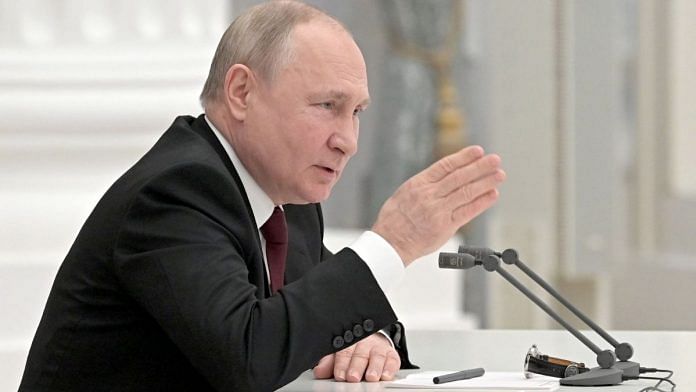It was the fourth day of the Russian military action against Ukraine when President Vladimir Putin instructed his nuclear forces to move into a “special mode of combat duty”. This was preceded by another statement that he had made when Russian forces started moving towards Ukraine, in which he cautioned the North Atlantic Treaty Organization, NATO, against any interference by threatening that the “consequences will be such as you have never seen in your entire history”.
Meanwhile, during the days of the build-up towards the invasion, there were reports that Russian strategic forces had carried out an extensive nuclear drill. Putin had overseen the exercise that tested the readiness of his command and control and the reliability of strategic nuclear and non-nuclear weapons. Most recently, Russian Foreign Minister Sergey Lavrov said in an interview with Al Jazeera that “a third World War would be a devastating nuclear war”.
Russia’s nuclear signalling
As is evident from the above timelines, Russia’s nuclear signalling started rather early in its conflict with Ukraine. Its nuclear brinkmanship was meant to ward off the possibility of a conventional conflict with the West. While the threat was being made with Ukraine in the crosshairs, the signal was clearly meant for the United States and NATO. It may be recalled that Russia has invested heavily in building its nuclear capability over the last two decades. Nuclear weapons are seen as a symbol of great powerdom and Moscow cherishes the ‘parity’ with the US.
In many of his recent national addresses, Putin has proudly mentioned the induction of hypersonic nuclear missiles and underwater nuclear drones as the ‘invincible weapons’ that give him an edge.
Signalling is a critical part of nuclear strategy. In fact, it is this threat of use of nuclear weapons that is meant to manipulate the adversary’s mind and actions. This is deemed far more important to deter the actual use of the weapon.
Russia, too, is playing by the same playbook. It has been showcasing its capabilities for years, and now in its action against Ukraine, Putin has found an opportunity to show resolve. Capability and resolve are critical to establishing the credibility of nuclear deterrence. And Putin is not shying away from communicating both.
Of course, when viewed rationally, there really are no credible scenarios where the use of nuclear weapons would actually enhance Russia’s position — not if it was to be used in Ukraine, an area that Russia wants to annex; and certainly not against a NATO country since the retaliation that would follow would nullify any gains Putin would hope to make. Therefore, in the classical understanding of deterrence, the likelihood of real use of the weapon should be low since no right-thinking leader would want to run the risk of inviting nuclear retaliation upon itself by using their own weapons first.
In fact, in this game, the distinction between tactical and strategic nuclear weapons is completely artificial. There can be no guarantee that the use of a low-yield nuclear weapon against a battlefield target, the so-called tactical nuclear weapon, would not quickly mutate into a large-scale strategic nuclear war. One hopes that the ongoing conflict will not move in that direction.
Also Read: How Russia’s invasion of Ukraine has undermined strategic choices available to India
Beyond the Ukraine conflict
One cannot, however, lightly dismiss the larger ramifications of this blatant nuclear signalling. Three of these clearly stand out.
The first is a rise in the stock of nuclear weapons. While the crisis may have led to a crash in markets across the world, the salience of nuclear weapons has risen by the manner in which a nuclear weapon State has sought to threaten a non-nuclear-weapon State, even if the real target of the signalling was elsewhere. States that are presently non-nuclear, but which face a hostile nuclear-armed adversary, would likely want to evaluate the value of having such a capability. Japan’s former Prime Minister Shinzo Abe was quick to call for such a consideration by his country, though the current leader has dismissed the possibility for now. Belarus, too, passed a referendum to renounce its non-nuclear status and seek the placement of nuclear weapons on its territory the day after Putin raised the alert level of his nuclear forces.
The second implication against this backdrop is the proliferation of nuclear weapons, whether through the individual acquisition of such capability by nations or by arriving at arrangements for placement of others’ nuclear weapons on their soil. More non-nuclear countries would seek the same sense of security that nuclear weapons States seem to enjoy, including of the kind that has allowed Russia to initiate brazen action against another non-nuclear armed State.
Third, the proliferation of nuclear weapons would also raise the risks of inadvertent nuclear escalation. High standards of nuclear command and control will be needed at every place holding such weapons in order to ensure stringent negative controls, that can minimise chances of stumbling into nuclear war due to inadvertence caused by an accident, a miscalculation or unauthorised action, especially during a crisis.
With the increase in the perceived value of nuclear weapons, the possibility of the elimination of nuclear weapons would be pushed away further. The world will have to manage a phase of heightened nuclear risks and instability as inter-State relations polarise even further. Indeed, Russia’s nuclear signalling has drawn attention to nuclear weapons in ways that will have implications for the nuclear landscape far beyond the theatre of conflict.
Also Read: Ukraine can’t be protected without getting hands dirty. Reassurances don’t work for Russia
Manpreet Sethi is a Distinguished Fellow at the Centre for Air Power Studies, New Delhi. She tweets @manpreetsethi01. Views are personal.
(Edited by Srinjoy Dey)



